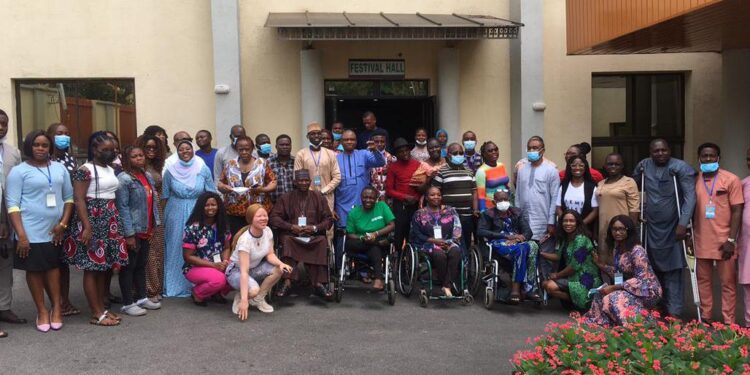The Centre for Citizens with Disabilities (CCD) has organised a one-week training for Organisations of Persons with Disabilities (OPDs) in Nigeria with support from the Disability Rights Fund (DRF) through its Technical Assistance funding program.
The training is to support OPDs on UN treaty monitoring mechanisms, alternative reporting, as well as rights-based advocacy using Convention on the Rights of Persons with Disabilities (CRPD) principles.
In his opening remark at the training, the Executive Director, Centre for Citizens with Disabilities (CCD), Mr David O. Anyaele, said that the training was provided as a prelude to the preparation of an alternative report to the CRPD Committee, following Nigeria’s submission of its initial report in Spring 2021.
CCD Executive Director further stated that the funding program provides resources to grantees for specialised advice and customised support to resolve specific problems and increase the capacity of organisations of persons and the more significant disability movement in target countries.
According to Mr Anyaele, the first three-day workshop was used to train selected leaders of organisations of persons with disabilities OPDs on alternative reporting so that participants understand the UN treaty system and monitoring mechanisms and the significant steps in writing an alternative report.
“The last two-day of the training focused on rights-based advocacy and outcome tracking and harvesting with a concentration on the Convention on the Rights of Persons with Disabilities (CRPD) principles.
“This is to ensure that grantees become more strategic in their advocacy and design projects that are result-oriented. It is also to ensure that participants can produce reports that identify outcomes of executed projects or activities,” Mr Anyaele said.
Ms Katiya Sakala, Regional Head of Program, Disability Rights Fund (DRF), said that they support the Nigeria OPDs DRF grantees to submit an alternative report to the UN Committee on the Rights of Persons with Disabilities.
“With Nigeria now having submitted their initial report on the rights of persons with disabilities. This is a requirement in article 33 of the UN Convention on the Rights of Persons with Disabilities. It is required that when the government submit their report, there should be a parallel report which supposed to be submitted by the Civil Society Organisations,” Katiya said.
Mr Theophilous Odaudu, Nigeria Program Officer, DRF, on his part, said “the significance of the training is that when a country ratifies international treaties, they have obligations; they have also reporting obligations to the treaty bodies.
“When they submit this report, it is expected that Civil Society Organisations (CSOs) will also be expected to bring an alternative report to show what is on the ground, to agree or disagree on what the government has reported.”
The lead facilitator at the training, Mr Foluso Adegalu, in his presentation, said that right-based advocacy is all about NGOs tracking their activities so that they can see the impact of your work on the ground. It allows you to reassess and reevaluate what you are doing and if there is any reason to modify your strategy and all that.
“Rights-based advocacy, as the words suggest, is advocating for the rights of persons with disabilities on the understanding that persons with disabilities are entitled to their rights not because it is a charitable option given to them by the State,” Foluso said.
One of the participants, Mrs Patience Ogolo-Dickson, thanked CCD and its partner Disability Rights Fund for the entire week of training on shadow reporting, rights-based advocacy and impact tracking.
“I have learnt so much about outcome tracking from this training. As an NGO and OPD, that is one thing that is missing in most of our work. It is a great opportunity for us, and for me in particular, especially to learn that. I am very sure that this would improve our work and further strengthen our organisation,” Mrs Ogolo-Dickson said.
Ms Florence Attah, Program Officer, Centre for Citizens with Disabilities (CCD), said that the training provided an opportunity for simulation exercise on CRPD Committee, including having participants draft an alternative report on specific sessions of the Nigerian Report and present their report to the Committee amongst others.

